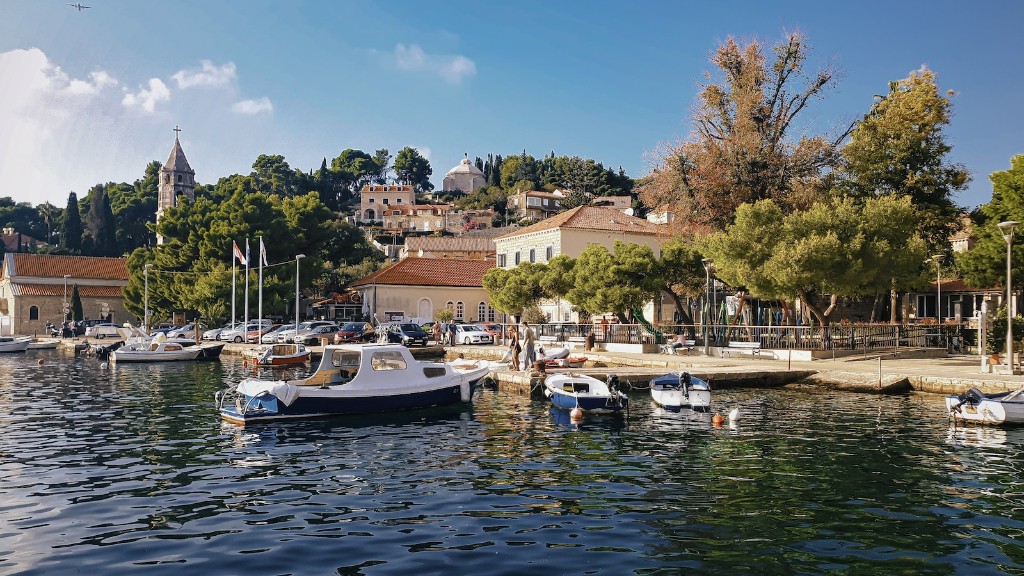Does Croatia Have Nuclear Weapons?
Croatia does not have nuclear weapons. In fact, Croatia is a party to the Non Proliferation Treaty (NPT), which forms the basis of modern concepts of nuclear non-proliferation. This treaty prohibits the transfer of nuclear weapons or other nuclear explosive devices to any recipient state, and also prohibits such states from manufacturing any such weapons. As a member of the NPT, Croatia has made certain commitments to ensure that it is in complete compliance with the provisions of the treaty. This means that Croatia does not have nuclear weapons and has no capability to develop or acquire them.
The Treaty on Non-Proliferation of Nuclear Weapons, which Croatia signs on June 4, 1993, is one of the most important prerequisites for Croatia to become integrated into the international community. By joining the NPT, Croatia has sent a message to the international community that it fully accepts and abides by the principle of nuclear non-proliferation. This has set Croatia apart as a responsible country in international relations, and also brought about an increased confidence within the EU and NATO.
Furthermore, Croatia has signed the Comprehensive Nuclear Test-Ban Treaty (CTBT), another legally binding document that prohibits all nuclear test explosions. The CTBT commits signatories to not undertake any nuclear weapon tests or other nuclear explosions. Croatia has also committed to permanently and completely abandon production and development of all nuclear weapons.
In addition, the Croatian Law on Non-Proliferation and Safety of Nuclear and Nuclear-Related Materials and Activities, requires the Croatian government to implement the relevant regulations in accordance with international standards. This includes international commitments to not acquire any nuclear weapons, and to comply with the Non-Proliferation Treaty. Moreover, the law also prohibits any activity related to the development, production, inspection, storage, transport, or use of nuclear weapons. Thus, it is clear that Croatia is fully committed to the principles of nuclear non-proliferation and nuclear safety.
The fact that Croatia does not have nuclear weapons, despite having access to both the necessary materials and the technological know-how is a testament to the country’s commitment to global nuclear disarmament. Moreover, Croatia’s decision to sign the NPT and CTBT has cemented its place as a responsible United Nations member. This has been reflected in the fact that Croatia is continuously praised for its commitment to nuclear non-proliferation and disarmament.
The History of the Non-Proliferation Treaty
The Non-Proliferation Treaty (NPT), which first came into effect in 1970, is an international agreement designed to prevent the spread of nuclear weapons. A total of 191 countries have signed the treaty and agreed to its principles. The treaty states that the spread of nuclear weapons’ proliferation shall be kept in check by discouraging the transfer of nuclear weapons and nuclear technology. It also requires each party to the treaty to undertake not to receive nuclear weapons from any source.
The NPT also requires that nuclear weapons states, such as the United States, Russia, France, China, and the United Kingdom, utilize their technological and economic resources to assist other countries in the development and implementation of peaceful nuclear power programs. Furthermore, the treaty also requires that all signatories actively pursue disarmament negotiations in good faith.
The International Atomic Energy Agency (IAEA) is the primary guardian of the NPT and is responsible for monitoring compliance and providing assistance for non-nuclear weapon states. The IAEA has established the Nuclear Verification System (NVS), which is the international system for verifying the compliance of countries with their treaty obligations. NVS involves the inspection of nuclear sites, the reporting of nuclear material inventories, and the enforcement of nuclear safety standards.
The NPT has been widely successful in preventing nuclear proliferation. The fact that no new nuclear weapon states have emerged since it came into effect is a testament to its effectiveness. Nonetheless, there is still much work to be done to ensure that the non-proliferation goals of the treaty are met.
The Benefits of Nuclear Non-Proliferation
Nuclear non-proliferation is an important tool in the prevention of nuclear war. This is because an environment devoid of nuclear weapons makes it much less likely that any accidental or intentional detonation may occur. Furthermore, a world without nuclear weapons lowers the risk of nuclear terrorism, which is an ever-increasing worry in today’s world.
Nuclear non-proliferation also helps to reduce the risk of accidental explosions, such as when nuclear materials are accidentally released into the environment due to human error or natural disasters, like earthquakes and tsunamis. By ensuring that materials remain in the hands of governments, who are in control of these materials and are held accountable for their use, there is less chance of a catastrophic event occurring.
Additionally, by pursuing a policy of nuclear non-proliferation, countries who have nuclear weapons are encouraged to move towards disarmament, which has a positive impact on international politics. This is because having an environment free of nuclear weapons offers more stability and security to a volatile world. Moreover, by having fewer nuclear weapons, the world does not have to worry as much about the possibility of nuclear weapons being used.
Furthermore, countries who are in pursuit of nuclear technology for peaceful purposes also benefit from nuclear non-proliferation. This is because nuclear materials and technology are much more easily obtained when there is a regime of non-proliferation in place. This helps to ensure that any such countries can benefit from the peaceful and beneficial uses of nuclear technology, such as medical and agricultural applications.
Croatia’s Commitment to Nuclear Non-proliferation
Croatia remains committed to the principles of nuclear non-proliferation, and is a country that has consistently lived up to its international and legal obligations. It has taken numerous steps to ensure that it is fully compliant with the terms of the NPT and CTBT. This includes restricting the transfer of nuclear materials and technology, as well as the implementation of the Non-Proliferation and Safety of Nuclear and Nuclear-Related Materials and Activities law. Croatia is thus a responsible member of the international community, and is committed to global nuclear disarmament.
The Challenges of Nuclear Non-Proliferation
Although the NPT has been successful in preventing the spread of nuclear weapons, there are still several challenges that must be overcome in order to ensure complete nuclear non-proliferation. One of the key issues is the lack of enforcement mechanisms for the NPT. This means that the promises made by countries to not acquire nuclear weapons may not be legally binding, and therefore, a country could choose to break its commitments to the treaty with little consequence.
In addition, the NPT does not provide any incentive for countries to give up nuclear weapons if they already possess them. This means that countries like the United States, Russia, France, China, and the United Kingdom may not be willing to relinquish their nuclear weapons, even if it would lead to increased stability in the world. Furthermore, the lack of verification mechanisms also leaves open the possibility of clandestine nuclear activities.
Furthermore, the NPT does not provide any clear rules regarding how to address violations of the treaty. In cases where countries are suspected of violating the NPT, there is no clear procedure for resolution. This makes enforcing the NPT difficult, and also makes it more likely that countries who have nuclear weapons may escape punishment for their transgressions.
The Future of Nuclear Non-Proliferation
In order for the NPT to be fully effective in preventing the spread of nuclear weapons, countries must commit to upholding the treaty and its principles. Additionally, more stringent enforcement mechanisms and more easily achievable compliance requirements must be put in place. Furthermore, incentives must be provided for countries who are currently in possession of nuclear weapons to voluntarily disarm.
Another key area where progress is needed is increasing verification and monitoring capabilities. This is particularly important for countries whose nuclear activities are less regulated, such as North Korea. Furthermore, better mechanisms for diplomatic resolution also need to be explored in order to prevent escalations between countries over alleged violations of the NPT.
Finally, the international community must remain committed to supporting nuclear non-proliferation. This may include providing more financial and technical support for countries to implement non-proliferation measures, and to demonstrate a commitment to a world without nuclear weapons. In this way, the international community can help to create an environment of peace and security, and promote a safer future for all.





